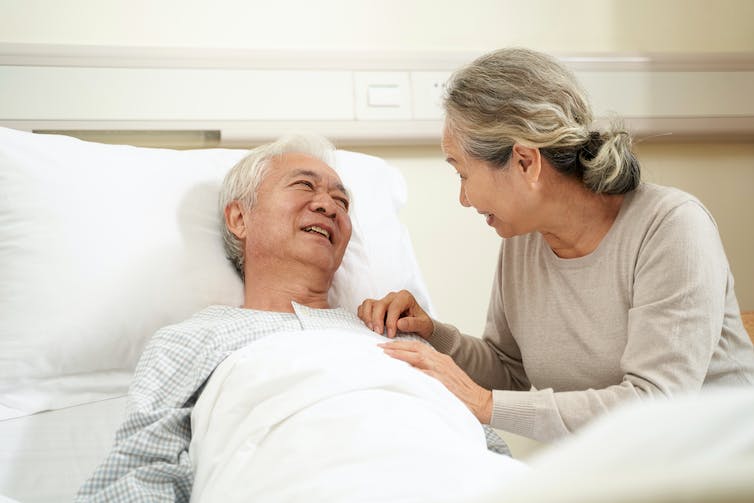
What happens to older adults who do not have close family when they develop dementia? The truth is, we hardly know.
Population aging together with changing patterns of marriage and childrearing mean that growing numbers of people in North America reach advanced ages without a living spouse or children. This matters because the incidence of dementia increases with age, and considerable support and care are needed to live well as the condition progresses. The vast majority of this care is provided by spouses and children.
There is reason to worry that older adults who lack family in these two relationship categories may be particularly vulnerable if they develop dementia. Until now, however, very little research has examined the topic.
Older adults with dementia without close kin
I am a medical anthropologist and I research social and cultural dimensions of illness and health care. (I am also the daughter of a mother who lived with dementia for a very long time).
For the past several years, I have been working with a team of fifteen other researchers — in fields that range from social work to public health, public policy, demography, nursing and several different medical specialties — to find out what happens to older adults who are “kinless” (i.e., they do not have a living spouse or children) at the time they develop dementia.

(Shutterstock)
Our team has worked with information collected as part of a long-running medical research study of dementia called the Adult Changes in Thought (ACT) study. Since the early 1990s, this study has been following participants recruited from the membership of an integrated health-delivery organization in Seattle to identify those who develop dementia.
Our team has been examining the research data and administrative documents generated by the ACT study, with an eye to what they can tell us about the circumstances and needs of older adults who were kinless when they developed dementia.
Qualitative analysis of ACT administrative documents, some of which contained clinical chart notes from participants’ medical records, proved to be an especially rich and informative source of data.
Surprising findings

(Shutterstock)
We recently published what we believe is the first article on kinless older adults with dementia, and some of the findings might surprise you:
-
This circumstance is not rare. In our sample of community-dwelling older adults, we found that 8.4 per cent were kinless at the time they developed dementia. (This is probably a conservative estimate, because more would likely become kinless after the onset of dementia, upon the death of a spouse and/or child).
-
This is a predicament to which anyone may be susceptible. The life trajectories that led people in our sample to be kinless at the time they developed dementia were quite varied. Some had never married or had children, but others had outlived both spouses and children.
-
The average age of the kinless older adults in our sample at the time they developed dementia was 87. Half were living alone at that point, and one-third were living with unrelated persons such as hired caregivers. Most were women who became kinless late in life and unexpectedly.
-
A person’s role as caregiver (at the time they developed dementia, or previous to that) could have important consequences for their own ability to access care. For example, some in our sample had previously moved to a residential setting to meet the needs of a spouse, which could mean that they were well situated to access care later. On the other hand, at least one of the 64 kinless older adults with dementia in our sample was serving as caregiver for a roommate (who also had dementia), which triggered an intervention when it led to a situation that was dangerous for both parties.
-
Some of the kinless older adults in our sample seemed to have little support, but others received considerable support from relatives such as nieces, nephews, sisters, grandchildren and others.
-
Some received support from neighbours and friends that could in some cases involve quite extensive hands-on care. In many instances, however, neighbours and other community members appeared to have gotten involved only at moments of crisis, as a form of rescue.
This research affords a rare window into the circumstances and needs of a potentially very vulnerable group that up to now has remained largely invisible. Our findings have implications for clinicians and health systems, but also for society more broadly.
“Who cares?” is, on one level, an informational question about caregiving networks — one that our team, through this research, has begun to answer. On another level, however, “who cares?” is a provocation. The predicament of kinless older adults with dementia should provoke all of us to work to better support people facing a form of precarity that anyone may be susceptible to in late life.
![]()
This work was supported by grant R21AG058056 from the National Institute on Aging at the National Institutes of Health. The Adult Changes in Thought study was supported by U01AG006781 (Larson and Crane, multiple PIs). Partial support for this research came from a Eunice Kennedy Shriver National Institute of Child Health and Human Development research infrastructure
grant, P2C HD042828, to the Center for Studies in Demography and Ecology (CSDE) at the University of Washington.
Disclaimer: The content is solely the responsibility of the authors and does not necessarily represent
the official views of the National Institutes of Health























